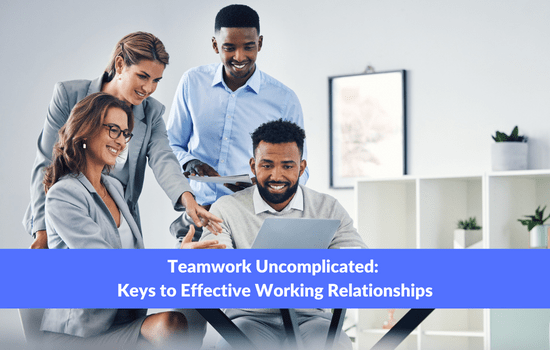Working effectively in a team can be challenging! Using your emotional intelligence is a superpower that impacts communication and relationship-building with other employees.
Creating a Positive Team Dynamic: Simple Strategies That Work

How well do you get along with your team? Do you feel your communication skills effectively support your interactions with other employees? This blog will provide some practical approaches to strengthen your relationships with others.
Use Emotional Intelligence To Navigate Team Dynamics.
Considering we don't always get to choose the team we work with within a professional setting, we require higher emotional intelligence to navigate employee relationships.
Occasionally, you may be assigned a project where your team members may not be on the same page as you. They may not share your vision, work ethic, or values. In this situation, the best practice is to be proactive and use relationship management strategies to help foster winning outcomes with employees.
Employees With High Emotional Intelligence Build Effective Relationships!
To build effective relationships with fellow employees, carefully observe the team members' body language and take cues from their non-verbal communication. Our body language has a critical impact on relationships. You can use social awareness skills to listen actively as the discussion unfolds. These actions will develop your emotional intelligence and, without a doubt, build your relationships with team members. I encourage you to check out my book, The Power of Emotion, A Practical Approach to Making the Most of Your Emotional Intelligence.
Top Five Tips To Build And Maintain Effective Relationships
Building effective relationships is crucial for success and satisfaction in personal or professional settings. Here are the top five tips to help you develop and maintain effective relationships:
- Listen actively to team members when they speak without interrupting or formulating your response in advance. Show that you genuinely care about their thoughts and feelings. - Use non-verbal cues, such as maintaining eye contact and nodding, to signal attentiveness.
- Try to empathize with other employees by trying to understand their perspectives, emotions, and needs of others. Put yourself in their shoes to grasp their point of view. Show compassion and support when others are going through difficult times.
- Communicate clearly and openly. Be honest and transparent in your interactions. Use "I" statements to express your feelings and thoughts without blaming or accusing others.
- Build trust by consistently following through on your commitments and promises. Be dependable so others can count on you in small and significant matters.
- Respect the individuality and boundaries of others. Everyone is entitled to their own opinions, values, and personal space. Set and communicate your boundaries clearly, and be receptive to the limitations of others.
Observe And Reflect
When you meet with your team, be sure to take note of your emotions and reactions to others. This form of observation will increase your emotional awareness. Take the time to review and reflect on your behaviour afterward. Remember, you must manage your feelings regardless of the situation. Your emotions will try to get the best of you; however, you can't allow them to control your behaviour, especially when participating in adverse discussions and decision-making.
Each employee brings both personal baggage and preferences to the table. So, you should start by getting to know each team member and learn their strengths, preferences, and areas they need to develop. This process establishes common ground and encourages collaboration.
Strategies To Avoid Conflict With Team Members
By implementing these strategies, leaders can create a team environment that minimizes the likelihood of conflicts and addresses them constructively when they arise. Below are approaches to help you avoid conflict with team members:
- Effective Communication: Maintain open, transparent, and honest communication with team members. Actively listen to their concerns and ideas without judgment. Clarify expectations and ensure everyone understands their roles and responsibilities.
- Set Clear Goals and Roles: Clearly define team goals, objectives, and individual roles. - Ensure that each team member knows what is expected of them and how their work contributes to the overall team's success.
- Conflict Resolution Training: Provide training on conflict resolution and encourage team members to use these skills when disagreements arise. Create a culture where conflict is an opportunity for growth and problem-solving rather than a negative occurrence.
- Foster a Positive Team Culture: Promote a culture of respect, trust, and inclusivity within the team. Celebrate achievements and acknowledge contributions to boost team morale. Address any disruptive behaviour promptly to maintain a positive atmosphere.
- Regular Team Check-Ins: Schedule regular team meetings to discuss progress, challenges, and concerns. - Use these meetings to identify and address potential conflicts before they escalate. - Encourage team members to express their opinions and concerns in a safe and respectful environment.
Effective relationships are a two-way street. Applying the above strategies and approaches to your interactions with other employees and encouraging these principles within your relationships is essential. Developing effective connections takes time and effort, but personal and professional growth rewards are substantial.
Working as a team becomes more comfortable and practical when using our emotional intelligence skills to build trusting relationships. Incorporating these recommendations will increase your emotional intelligence, strengthen your communication skills, and support your connections on your journey to excellence. If you want to improve your self-awareness, a key component of emotional intelligence, consider taking a self-assessment to provide a personal analysis of your perception of your behaviour.
This article was originally published on June 16, 2018, and has been updated (September 2023).
More Motivational Reads Here »
How Emotionally Intelligent Are You?
Sign up for Linda’s monthly tips to build your Emotional Intelligence and reduce Emotional Hijacking!

















